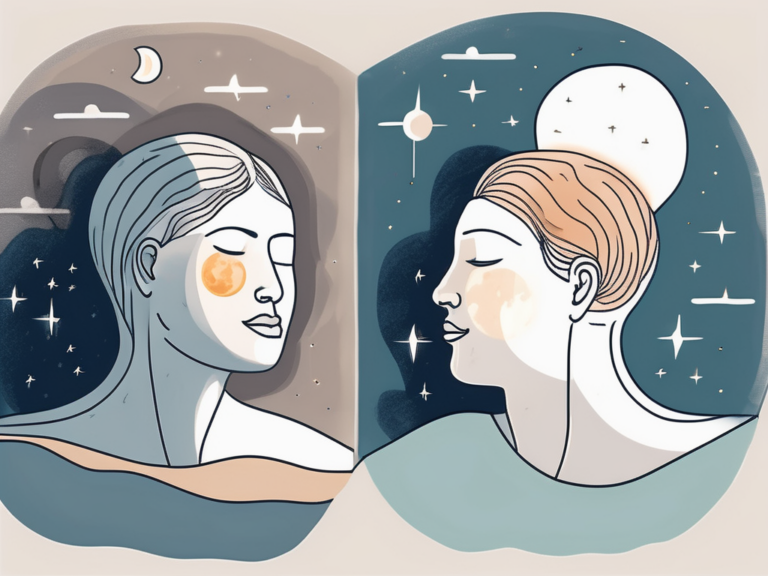Tips to Sleep Better When Stressed
In today’s fast-paced and demanding world, it’s not uncommon to experience stress that affects our ability to get a good night’s sleep. The connection between stress and sleep is complex and multifaceted, but understanding the underlying science can help you identify ways to manage both effectively. In this article, we will explore the science behind stress and sleep, discuss common stressors that affect sleep quality, and provide practical tips to help you sleep better when stressed.
Understanding the Connection Between Stress and Sleep
Stress and sleep have a reciprocal relationship. While stress can disrupt sleep, insufficient sleep can also contribute to heightened levels of stress. Understanding this connection is crucial to finding effective solutions.
The Science Behind Stress and Sleep
When we experience stress, our body releases cortisol, a hormone that triggers the body’s “fight or flight” response. While cortisol is essential for survival, excessive levels of it can interfere with our sleep cycles. The elevated cortisol levels can make it difficult to fall asleep, stay asleep, or achieve deep restorative sleep.
Moreover, stress can activate the sympathetic nervous system, increasing heart rate and alertness, making it challenging to relax and unwind before bedtime. This state of hyperarousal can lead to insomnia and perpetuate a cycle of stress and sleep deprivation.
How Stress Affects Your Sleep Quality
Stress affects sleep quality in various ways. It can cause fragmented sleep, restless tossing and turning, and vivid dreams. Additionally, stress can lead to an increase in sleep disorders such as insomnia, sleep apnea, and restless leg syndrome. These sleep disturbances can further intensify feelings of stress, creating a vicious cycle.
Furthermore, chronic stress can disrupt the body’s natural circadian rhythm, the internal clock that regulates sleep-wake cycles. This disruption can result in irregular sleep patterns, making it challenging to establish a consistent sleep routine. Without a regular sleep schedule, the body struggles to find a balance between wakefulness and rest, leading to increased stress levels.
In addition to the physiological effects, stress can also impact our mental and emotional well-being, further affecting our sleep. When we are stressed, our minds tend to race with worries, anxieties, and intrusive thoughts, making it difficult to quiet the mind and fall asleep. The constant mental chatter can keep us awake at night, preventing us from getting the restful sleep we need to recharge and recover.
Identifying Your Stress Triggers
Recognizing and understanding your stress triggers is a crucial step in managing stress and improving sleep quality. By pinpointing the specific situations, events, or thoughts that cause you stress, you can develop strategies to cope more effectively.
Let’s delve deeper into the world of stress triggers and explore some of the most common culprits that can disrupt your sleep patterns and overall well-being.
Common Stressors That Affect Sleep
Stressors can vary from person to person, but some common culprits include work-related pressures, financial concerns, relationship difficulties, and health issues. These stressors can infiltrate your mind, leaving you tossing and turning throughout the night, unable to find the peace and tranquility necessary for a restful sleep.
Work-related pressures can stem from demanding deadlines, challenging projects, or a toxic work environment. Financial concerns can weigh heavily on your mind, causing anxiety about bills, debts, and future financial stability. Relationship difficulties, whether with a partner, family member, or friend, can create emotional turmoil that disrupts your ability to relax and unwind. Lastly, health issues, whether physical or mental, can trigger stress and make it difficult to achieve the deep sleep your body craves.
Identifying these stressors and developing coping mechanisms can help alleviate their negative impact on your sleep. By acknowledging the specific triggers that affect you, you can take proactive steps to address them and find healthier ways to manage stress.
The Role of Lifestyle in Stress Management
While it’s impossible to eliminate stress entirely, a healthy lifestyle can significantly mitigate its effects. Engaging in regular physical activity not only helps to release endorphins, the “feel-good” hormones, but also reduces the levels of stress hormones in your body. This physical release can provide a much-needed outlet for pent-up stress and tension.
In addition to exercise, maintaining a balanced diet is crucial for stress management. Consuming a variety of nutrient-rich foods can support your body’s ability to cope with stress. Foods rich in vitamins and minerals, such as fruits, vegetables, whole grains, and lean proteins, can provide the necessary fuel for your body and mind to combat stress.
Practicing relaxation techniques like deep breathing, meditation, and yoga can also contribute to stress reduction and better sleep. These activities help activate the body’s relaxation response, counteracting the effects of stress and promoting a sense of calm and tranquility.
By incorporating these lifestyle practices into your daily routine, you can create a solid foundation for stress management and improve the quality of your sleep. Remember, understanding your stress triggers is just the first step; taking action to address them is where true transformation begins.
Techniques for Stress Management
Now that you have a better understanding of stress and its impact on sleep, let’s explore some techniques you can incorporate into your daily routine to manage stress effectively.
Mindfulness and Meditation for Stress Relief
Mindfulness and meditation practices can help calm an overactive mind and reduce stress levels. Taking a few minutes each day to focus on your breath, observe your thoughts without judgment, and cultivate gratitude can promote relaxation and improve sleep quality.
When practicing mindfulness, it’s important to find a quiet and comfortable space where you can fully immerse yourself in the present moment. Close your eyes and take a deep breath, allowing any tension in your body to melt away. As you continue to breathe deeply, bring your attention to the sensations in your body, noticing any areas of tightness or discomfort. With each breath, imagine releasing that tension and replacing it with a sense of calm and tranquility.
In addition to mindfulness, incorporating meditation into your daily routine can provide profound stress relief. Find a comfortable seated position and gently close your eyes. Begin by focusing on your breath, feeling the cool air enter your nostrils on the inhale and the warm air exit on the exhale. As thoughts arise, simply acknowledge them without judgment and gently bring your attention back to your breath. With consistent practice, you’ll find that your mind becomes more peaceful and your ability to manage stress improves.
Physical Activities to Reduce Stress
Engaging in regular physical activities such as brisk walking, jogging, or practicing yoga can be immensely beneficial for stress reduction. Exercise releases endorphins, which are natural mood boosters, and promotes a sense of wellbeing that can carry over into improved sleep.
When it comes to choosing a physical activity to reduce stress, it’s important to find something that you enjoy and that fits into your lifestyle. If you prefer being outdoors, consider going for a hike or bike ride in nature. The fresh air and natural surroundings can help clear your mind and provide a sense of peace. If you prefer indoor activities, you might find solace in a dance class or a high-intensity interval training (HIIT) session. The key is to find an activity that allows you to release any pent-up stress and tension, while also providing a sense of enjoyment and fulfillment.
Remember, managing stress is a lifelong journey, and it’s important to be patient and kind to yourself along the way. By incorporating mindfulness, meditation, and physical activities into your daily routine, you can take proactive steps towards reducing stress and improving your overall well-being.
Improving Your Sleep Hygiene
Creating a sleep-inducing environment and adopting healthy sleep habits can significantly enhance your sleep quality, especially during periods of heightened stress. But did you know that there are even more factors that can contribute to a restful night’s sleep? Let’s dive deeper into the world of sleep hygiene and explore some additional tips to help you achieve the best sleep possible.
Creating a Sleep-Inducing Environment
Ensure that your sleep environment is conducive to restorative sleep. Keep your bedroom cool, dark, and quiet. This means not only adjusting the thermostat to a comfortable temperature but also investing in blackout curtains or an eye mask to block out any unwanted light. Additionally, consider using earplugs or a white noise machine to drown out any disruptive sounds that might disturb your slumber.
But it doesn’t stop there. The quality of your mattress and pillow can also greatly impact your sleep. A comfortable mattress that provides adequate support for your body can make all the difference in how well you rest. Similarly, finding the perfect pillow that suits your sleeping position and preferences can help alleviate any discomfort and promote a more peaceful sleep.
The Importance of a Consistent Sleep Schedule
Establishing a consistent sleep schedule is crucial for maintaining a healthy sleep-wake cycle. While going to bed and waking up at the same time every day is a good start, there are a few more things to consider. Firstly, try to create a pre-sleep routine that allows your mind and body to wind down before bedtime. This could include activities such as reading a book, practicing relaxation techniques, or taking a warm bath.
Another aspect to keep in mind is the influence of electronics and excessive noise on your sleep. The blue light emitted by electronic devices, such as smartphones and tablets, can interfere with your body’s natural sleep hormones. It’s best to avoid using these devices at least an hour before bed. Additionally, try to minimize any noise disturbances in your sleep environment. If you live in a noisy area, consider using earplugs or a white noise machine to create a more peaceful atmosphere.
By taking these additional steps to improve your sleep hygiene, you can further enhance the quality of your sleep and wake up feeling refreshed and rejuvenated. Remember, a good night’s sleep is not just a luxury; it’s an essential part of maintaining overall health and well-being.
Nutritional Tips for Better Sleep
The food we consume plays a significant role in our overall health and sleep quality. Making thoughtful choices about what we eat, especially close to bedtime, can positively impact our ability to sleep well, even when stressed.
When it comes to promoting better sleep, incorporating sleep-friendly foods into your diet can make a world of difference. One such group of foods are those rich in tryptophan. Tryptophan is an amino acid that helps in the production of serotonin and melatonin, hormones that regulate sleep. So, if you’re looking to enhance your sleep quality, consider adding foods like turkey, almonds, and bananas to your evening meals or snacks. These delicious options not only provide a boost of tryptophan but also offer other essential nutrients that support overall health.
In addition to incorporating sleep-friendly foods, it’s equally important to be mindful of the drinks we consume before bedtime. While a warm cup of herbal tea can be soothing and beneficial for sleep, it’s best to avoid consuming stimulants such as caffeine and alcohol close to bedtime. Caffeine, found in coffee, tea, and some sodas, is a known stimulant that can interfere with sleep patterns, making it harder to fall asleep and reducing sleep quality. Similarly, alcohol may initially make you feel drowsy, but it can disrupt the later stages of sleep, leading to fragmented and less restorative rest.
Foods That Promote Sleep
Incorporating sleep-friendly foods into your diet can enhance sleep quality. Some examples include foods rich in tryptophan, like turkey, almonds, and bananas, which promote the production of serotonin and melatonin, hormones that regulate sleep.
Another group of foods that can aid in better sleep are those that contain magnesium. Magnesium is a mineral that plays a crucial role in regulating sleep by helping to relax muscles and calm the nervous system. Foods such as spinach, pumpkin seeds, and dark chocolate are excellent sources of magnesium and can be incorporated into your evening meals or consumed as a bedtime snack.
Drinks to Avoid Before Bedtime
Avoid consuming stimulants such as caffeine and alcohol close to bedtime. These substances can disrupt sleep patterns, making it harder to fall asleep and reducing sleep quality.
In addition to caffeine and alcohol, it’s also advisable to limit your intake of sugary beverages before bedtime. Sugary drinks, such as soda or fruit juices, can cause a spike in blood sugar levels, leading to energy crashes and potential sleep disturbances. Opting for hydrating alternatives like herbal tea or infused water can be a more sleep-friendly choice.
By being mindful of the foods we consume and the drinks we choose, we can create an environment that promotes better sleep. So, next time you’re planning your meals or reaching for a bedtime beverage, remember to consider the impact it may have on your sleep quality. Making small adjustments to your diet can lead to significant improvements in your overall sleep health.
When to Seek Professional Help
While implementing these tips can significantly improve sleep quality, some individuals may require professional guidance to address chronic sleep problems caused by stress.
Recognizing Chronic Sleep Problems
If your sleep disturbances persist despite your best efforts, it may be a sign of an underlying sleep disorder or chronic stress condition that requires medical intervention. Consult with a healthcare professional who specializes in sleep medicine for a proper evaluation and personalized treatment plan.
The Role of Therapy in Sleep Improvement
Therapeutic interventions, such as cognitive-behavioral therapy for insomnia (CBT-I), can be highly effective in addressing sleep disturbances caused by stress. CBT-I focuses on identifying and changing negative thought patterns and behaviors that contribute to insomnia, providing long-lasting sleep improvement.
Understanding the complex relationship between stress and sleep is crucial in finding effective solutions. Chronic stress not only disrupts our sleep patterns but also affects our overall well-being. When stress becomes overwhelming, it can lead to a vicious cycle of sleep deprivation and increased stress levels, further exacerbating the problem.
It is important to recognize that managing stress and improving sleep quality when stressed can be challenging but not impossible. By understanding the connection between stress and sleep, identifying stress triggers, implementing stress management techniques, adopting healthy sleep habits, and seeking professional help when needed, you can take proactive steps towards achieving restorative sleep even during stressful times.






